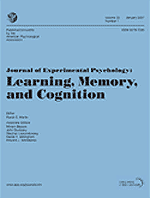
JOURNAL OF EXPERIMENTAL PSYCHOLOGY-LEARNING MEMORY AND COGNITION
Scope & Guideline
Bridging theory and practice in experimental psychology.
Introduction
Aims and Scopes
- Cognitive Mechanisms of Learning and Memory:
The journal publishes studies exploring the cognitive processes underlying learning and memory, including encoding, retrieval, and the effects of various factors such as attention and emotion. - Experimental Methodologies:
Research published in the journal frequently employs rigorous experimental methodologies, including behavioral experiments, eye-tracking, and electrophysiological techniques, to investigate cognitive phenomena. - Interdisciplinary Approaches:
The journal encourages interdisciplinary research that integrates insights from psychology, neuroscience, linguistics, and education to enhance our understanding of cognitive processes. - Individual Differences in Cognitive Abilities:
A significant focus is placed on understanding how individual differences, such as working memory capacity and cognitive control, influence learning and memory performance. - Language Processing:
The journal includes research on the cognitive mechanisms involved in language processing, including lexical access, sentence comprehension, and the interaction between language and memory.
Trending and Emerging
- Multimodal Learning and Memory:
There is an increasing emphasis on how different sensory modalities interact during learning and memory tasks, including studies on multisensory integration and the effects of environmental cues. - Dynamic and Contextual Memory Processes:
Recent research highlights the importance of context in memory retrieval and encoding, suggesting that memory is not only a static store but is influenced by situational factors and cognitive demands. - Neuroscientific Perspectives:
An emerging trend involves integrating neuroscientific methods, such as neuroimaging and electrophysiological measures, to provide insights into the neural underpinnings of learning and memory. - Cognitive Control and Flexibility:
There is growing interest in understanding cognitive control processes, including how individuals adapt their memory strategies based on task demands and environmental changes. - Language and Memory Interactions:
Research increasingly explores the interplay between language processing and memory, focusing on how linguistic structures impact memory performance and retrieval.
Declining or Waning
- Traditional Memory Models:
There is a noticeable decrease in studies adhering strictly to traditional memory models, as newer research tends to explore more nuanced and dynamic approaches to understanding memory. - Simple Stimulus-Response Paradigms:
Research employing basic stimulus-response paradigms has waned, with a shift towards more complex cognitive tasks that reflect real-world scenarios and cognitive interactions. - Static Cognitive Assessments:
The focus on static assessments of cognitive abilities (e.g., standardized tests) is declining in favor of dynamic assessments that consider the variability of cognitive function across different contexts and tasks.
Similar Journals

PSYCHONOMIC BULLETIN & REVIEW
Shaping the Future of Psychological Research and Discourse.PSYCHONOMIC BULLETIN & REVIEW is a premier journal published by SPRINGER, dedicated to advancing the fields of psychology, particularly within the domains of Arts and Humanities, Developmental and Educational Psychology, and Experimental and Cognitive Psychology. With its ISSN 1069-9384 and E-ISSN 1531-5320, the journal serves as a vital resource for researchers, professionals, and students striving to stay at the forefront of psychological science. The journal boasts an impressive impact factor and ranks in the top quartile (Q1) in relevant categories, reflecting its prestigious standing in the academic community. Covering research from 1994 to 2024, it offers rich interdisciplinary insights into psychological processes and theoretical developments, supporting researchers in disseminating their findings effectively. While not an open-access journal, it provides various access options to ensure that vital research remains within reach of its audience. With a commitment to fostering scholarly dialogue and innovation, PSYCHONOMIC BULLETIN & REVIEW plays an indispensable role in shaping contemporary psychological discourse.

JOURNAL OF PSYCHOLINGUISTIC RESEARCH
Exploring the Intersection of Language and MindJOURNAL OF PSYCHOLINGUISTIC RESEARCH is a premier scholarly publication dedicated to the interdisciplinary exploration of language and cognition. Established in 1971 and published by Springer/Plenum Publishers, this journal serves as a vital platform for researchers in Experimental and Cognitive Psychology, Linguistics, and related fields. With an impressive reputation reflected in its 2023 Category Quartiles—Q3 in Experimental and Cognitive Psychology, Q1 in Linguistics and Language, and Q2 in Psychology (miscellaneous)—the journal ranks prominently within the Scopus database, reaching the 88th percentile in Language and Linguistics. Researchers and professionals have the opportunity to disseminate their findings effectively, enriching contemporary understanding of psycholinguistic phenomena through rigorous peer-reviewed articles. Although currently not an open-access journal, it provides extensive access options that cater to a global audience, ensuring that the latest research is readily available to those dedicated to advancing this dynamic field. We invite scholars, practitioners, and students to engage with this essential resource for fresh insights and innovative research methodologies.

Language and Cognition
Diving Deep into Language's Role in Cognitive ProcessesLanguage and Cognition is a premier peer-reviewed journal published by Cambridge University Press, dedicated to advancing the fields of language, linguistics, and cognitive psychology. With an ISSN of 1866-9808 and E-ISSN of 1866-9859, it has rapidly established itself as a pivotal resource for researchers, educators, and practitioners alike. Recognized for its rigorous scholarship, the journal holds a Q1 ranking in Linguistics and Language and a Q2 ranking in Experimental and Cognitive Psychology for 2023, reflecting its esteemed positioning within the academic community. Since transitioning to open access in 2023, it has broadened its reach, making cutting-edge research accessible to a global audience. The journal's emphasis on interdisciplinary studies ensures a comprehensive exploration of the interactions between language and cognitive processes, fostering deeper insights and fostering collaboration across domains. Researchers and professionals looking to stay at the forefront of advancements in these vital areas will find Language and Cognition an invaluable platform for disseminating their findings and engaging with contemporary debates.

PSYCHOLOGICAL RESEARCH-PSYCHOLOGISCHE FORSCHUNG
Elevating psychological research to new heights of excellence.Psychological Research – Psychologische Forschung is a renowned interdisciplinary journal published by Springer Heidelberg, operating from Germany. As a key publication in the field of psychology, particularly spanning areas such as experimental and cognitive psychology, developmental and educational psychology, and arts and humanities, this journal has made significant contributions to the advancement of psychological science since its inception in 1974. With an impressive impact reflected through its Q1 and Q2 categorizations across various fields, it occupies a prominent position in Scopus rankings, notably ranked #35 in Experimental and Cognitive Psychology. Researchers, professionals, and students alike benefit from its rich repository of original empirical studies, reviews, and methodological advancements. Whether you're seeking to contribute to your field or stay abreast of the latest developments, Psychological Research provides a crucial platform for disseminating innovative psychological knowledge. With a convergence of research years leading to 2024, the journal continues to evolve, maintaining its relevance and excellence within the academic community.
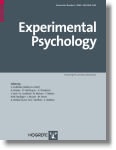
EXPERIMENTAL PSYCHOLOGY
Shaping the discourse in experimental and cognitive psychology.EXPERIMENTAL PSYCHOLOGY is a premier journal dedicated to advancing the field of psychology through rigorous empirical research and innovative theoretical insights. Published by HOGREFE PUBLISHING CORP, this esteemed journal features an array of studies that delve into cognitive processes, experimental methodologies, and the intricate workings of human behavior. With a significant impact factor, EXPERIMENTAL PSYCHOLOGY holds a Q1 ranking in Arts and Humanities and maintains a commendable presence in the realms of Experimental and Cognitive Psychology. By providing Open Access options, the journal ensures that vital psychological research is widely accessible, fostering collaboration and knowledge sharing among researchers, practitioners, and students worldwide. Based in the United States, it has been a cornerstone of psychological literature since 1998, continuing to shape the discourse in its diverse and interdisciplinary scope. Researchers seeking to contribute to or stay informed about the latest advancements in psychological science will find EXPERIMENTAL PSYCHOLOGY an invaluable resource.

Cognitive Processing
Unraveling the complexities of cognition with every issue.Cognitive Processing, published by SPRINGER HEIDELBERG in Germany, is a leading journal dedicated to advancing the understanding of cognitive processes through interdisciplinary research. With its ISSN 1612-4782 and E-ISSN 1612-4790, the journal covers a diverse range of fields including Artificial Intelligence, Cognitive Neuroscience, and Experimental and Cognitive Psychology, making it an invaluable resource for researchers and professionals alike. While it currently does not operate under an Open Access model, it is well-regarded within the academic community, holding a respectable impact factor and ranking in the Q2 and Q3 quartiles as of 2023. The journal aims to foster innovation and collaboration among scholars, presenting high-quality original research, reviews, and theoretical discussions that bridge the gap between cognitive science and its practical implications. With a convergence of research from 2005 to 2024, Cognitive Processing continues to play a critical role in the evolving landscape of cognitive science literature.
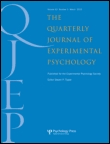
QUARTERLY JOURNAL OF EXPERIMENTAL PSYCHOLOGY
Shaping the Future of Psychological ScienceQuarterly Journal of Experimental Psychology, published by SAGE Publications Ltd, is a leading peer-reviewed journal that serves as a vital resource in the fields of experimental and cognitive psychology, neuropsychology, and medicine. With an impactful contribution to psychological research, the journal is recognized for its rigorous methodology and empirical studies, holding a notable ranking among its peers—finding itself in the Q2 quartile across several categories. With its origin tracing back to 2006, Quarterly Journal of Experimental Psychology significantly influences the academic discourse until its latest published findings in 2024. Catering to a diverse audience of researchers, professionals, and students, this journal provides Open Access options, enhancing the reach and accessibility of cutting-edge psychological research. By focusing on innovative approaches and findings, it aims to bridge theoretical understanding with practical application, hence fostering advancement in multiple related disciplines. For those committed to understanding the complexities of human behavior and cognitive processes, this journal remains an essential reference point.
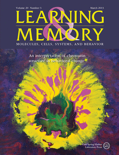
LEARNING & MEMORY
Illuminating the Pathways of the MindLEARNING & MEMORY is a prestigious journal dedicated to the expansive field of neuroscience, focusing specifically on the intricate mechanisms underlying learning processes and memory formation. Published by COLD SPRING HARBOR LAB PRESS, PUBLICATIONS DEPT, this journal has established itself as a critical platform for research since its inception in 1994, with an anticipated convergence until 2024. With a notable impact factor in the realms of cellular and molecular neuroscience, cognitive neuroscience, and neuropsychology, it proudly ranks in the top quartiles of these disciplines. Although the journal is not open access, it remains a vital resource for scholars seeking to leverage cutting-edge research to advance their understanding of cognitive processes. Those engaged in the fields of psychology and neuroscience will find LEARNING & MEMORY to be an essential source for empirical studies, theoretical reviews, and methodological advancements, making it indispensable for researchers, professionals, and aspiring students alike.

EXPERIMENTAL BRAIN RESEARCH
Bridging Theory and Experimentation in Brain ScienceEXPERIMENTAL BRAIN RESEARCH is a renowned journal published by SPRINGER, dedicated to advancing understanding in the field of neuroscience. With a history dating back to 1966, this journal offers valuable insights into the mechanisms of brain function and neurological disorders, making it a vital resource for researchers, professionals, and students alike. While it currently holds a Q3 classification in the field of Neuroscience (miscellaneous) and ranks #73 out of 113 in Scopus's General Neuroscience category, it continually contributes to fostering innovative research and collaborative dialogue. The journal is not open access, ensuring that although content is subscription-based, it maintains a high standard of peer review and scholarly rigor. By covering a breadth of topics relevant to both experimental and theoretical aspects of brain research, EXPERIMENTAL BRAIN RESEARCH serves as an essential platform for disseminating cutting-edge discoveries and theories in the dynamic realm of neuroscience.
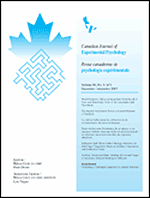
CANADIAN JOURNAL OF EXPERIMENTAL PSYCHOLOGY-REVUE CANADIENNE DE PSYCHOLOGIE EXPERIMENTALE
Innovative Insights into Cognitive ProcessesCanadian Journal of Experimental Psychology / Revue canadienne de psychologie expérimentale (ISSN 1196-1961, E-ISSN 1878-7290), published by the Canadian Psychological Association, serves as a vital resource in the fields of Experimental and Cognitive Psychology and general psychological research. With a respectable impact factor that places it in the Q3 category for both Experimental Psychology and miscellaneous Medicine (2023), this journal offers a platform for innovative research that furthers our understanding of psychological processes. Spanning years from 1993 to 2024, it connects researchers, professionals, and students to contemporary findings and methodologies, fostering a collaborative environment for the advancement of psychological science. Though it does not currently offer Open Access, the journal's commitment to quality and relevance in psychological research continues to make it an important part of the academic landscape, supporting the dissemination of knowledge within a global community.